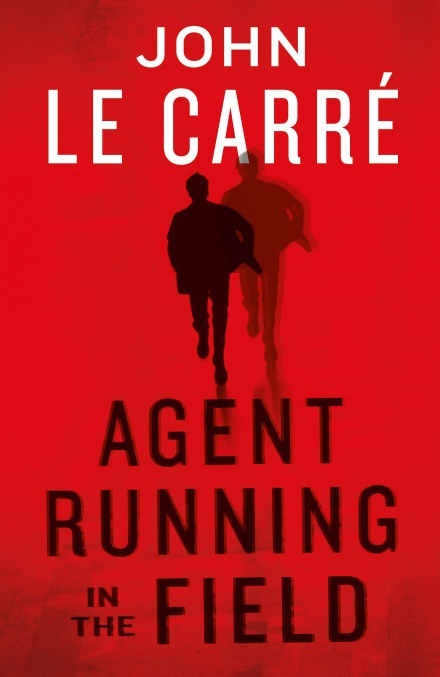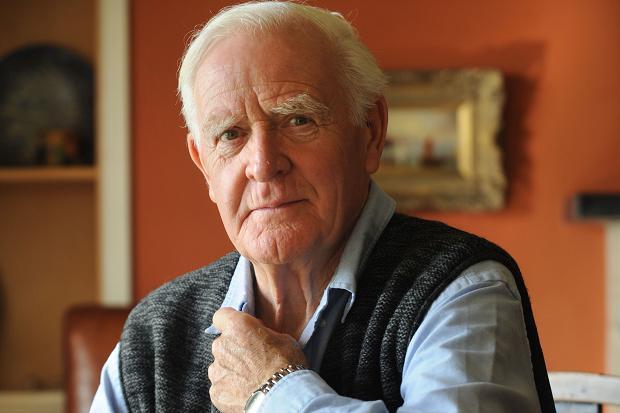That John le Carré! It turns out the agent isn’t so much running in the field as playing badminton. The master of the spy novel, of the foibles fantasies and sadnesses of our imperfect world – with the occasional excursion to excoriate Big Pharma and the like – has produced a magnificent slow burner. The short novel is predicated on Britain’s current mess, in which the country is betrayed by its own nostalgia and incipient xenophobia.
Now in his 88th year this is Le Carré’s 25th novel. His last, A Legacy of Spies, was elegiac: a trip down memory lane to sort out an incident from the distant past. Memorable characters featured – including George Smiley himself, in an open-ended conclusion to a tragic encounter in the distant past. Le Carré’s two dozen novels – not to mention the films and plays for radio and television – have changed the literary terrain – the very language – of spydom.
But now comes Le Carré as we’ve never read him before. Here, he treads no familiar ground except for MI6’s bureaucratic speak – the Office in full flow – suffered by our middle-aged hero, Nat. Le Carré’s newest excursion is unexpectedly contemporary. That it is, exceptionally, written in the first person, in the historic present, emphasises its passionate topicality. It is a snappy, funny and very angry story about contemporary Britain, at the time of the run up to Trump’s 2018 visit. It hinges on – of all things – badminton. While the opening is creaky, as the plot accelerates we warm to the characters. Except for the eloquent indignation and barely suppressed fury, itself purposely awkward and inelegant, it is a huge departure from what we might expect.
 We open in the Athleticus, a health and drinking club in Battersea, where a swimming pool meshes somehow with a big bar. Here is our narrator, Nat, back in London after a career running agents – persuading them to betray the country they didn’t even know they longed for until they did – for money perhaps but more for a kind of idealism. At 47 he is still his club’s badminton champion until he is approached by an aspirant to the badminton crown, 20-something Ed who demands a series of weekly games. Ed waxes powerfully indignant about the horrors of modern Britain and Brexit, but an unlikely friendship develops in which each conceals their true employment from each other
We open in the Athleticus, a health and drinking club in Battersea, where a swimming pool meshes somehow with a big bar. Here is our narrator, Nat, back in London after a career running agents – persuading them to betray the country they didn’t even know they longed for until they did – for money perhaps but more for a kind of idealism. At 47 he is still his club’s badminton champion until he is approached by an aspirant to the badminton crown, 20-something Ed who demands a series of weekly games. Ed waxes powerfully indignant about the horrors of modern Britain and Brexit, but an unlikely friendship develops in which each conceals their true employment from each other
Nat has worked Central, Eastern and Northern Europe. The only time he worked with his very clever wife Prue, was in Moscow. Though Nat thought she would have made a better spy than, Prue is now a highly successful civil rights lawyer. They have a bolshy student daughter, Steff, who thinks her father an unsuccessful minor foreign office apparatchik. When, anxious for more respect, he reveals himself as a spy she is disdainfully incredulous. Le Carré draws fine differences between nationalism and patriotism. Now home, probably for good, Nat is apparently about to be booted out by MI6 for staleness and age, but instead, in an echo of Mick Herron’s Slough House, is tossed sideways to run The Haven, an odd north London outpost with spies who do not seem headed for the top.
We meet the young, beautiful and idealistic Florence. She is talented and potentially headed for higher things, but currently fixated on getting funding for a huge and risky investigation of a crooked Ukrainian oligarch known as Orson, who is ensconced in a billionaire London penthouse. Orson funds Brexiteers – a breed held in contempt by Florence – and, it turns out, Ed. Le Carré peels away layer upon layer, slowly. The state of Nat’s marriage slowly comes out through some curiously touching pillow talk. A past love affair in the field is slowly revealed. Steff turns up with a more than acceptable scientist fiancé.
Some of the twists are obvious: Ed is not quite what he seems, and it turns out he too is capable of betrayal. He’s clumsy, naïve yet curiously successful – a mini Snowden. The incendiary documents he hopes to places in the right hands (as he sees it) are certainly headed towards the wrong. In a neat echo of the Cold War, alliances shift quite dramatically.
Badminton even brings Ed and Florence together. Both in their own ways are exceptionally active Remainers who feel sabotaged by their own country which, they have discovered, is covertly working with Trump-country to destabilise the EU. Fantasy? Fact? As always, Le Carré somehow stage-manages a slow-burn empathy for his characters. Maddening stereotypes slowly turn into people, full of confusion and passion. In an appealing contrast to the weariness of the mid-lifers, he captures the explosive rage of the young bloods who think things can be put right. The simplistic, youthful rantings of those on the first steps on a ladder – who do not know where it might lead – can lift their cynical fatigue.
Even in this most cynical, saddened book, there remains a curious element of optimism: amoral Nat is anxious to do the right thing. But personal redemption does not translate into a political salvation. Le Carré’s gift in these turbulent times is to show his affection for Britain, undiluted in some miraculous way by his incendiary fury at its present state. And there is a real twist: not an infiltration, an agent heading into the field, but an exfiltration. Read it and see.
- Agent Running in the Field by John Le Carré (Viking, £20 hardback)
- Read more book reviews on theartsdesk















Add comment